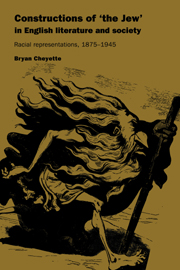Book contents
- Frontmatter
- Contents
- Preface
- Acknowledgements
- 1 Introduction: semitism and the cultural realm
- 2 The promised land of liberalism: Matthew Arnold, Anthony Trollope and George Eliot
- 3 Empire and anarchy: John Buchan and Rudyard Kipling
- 4 The ‘socialism of fools’: George Bernard Shaw and H. G. Wells
- 5 The limits of liberalism: Hilaire Belloc and G. K. Chesterton
- 6 Modernism and ambivalence: James Joyce and T. S. Eliot
- 7 Conclusion: semitism and the crisis of representation
- Bibliography
- Index
2 - The promised land of liberalism: Matthew Arnold, Anthony Trollope and George Eliot
Published online by Cambridge University Press: 19 October 2009
- Frontmatter
- Contents
- Preface
- Acknowledgements
- 1 Introduction: semitism and the cultural realm
- 2 The promised land of liberalism: Matthew Arnold, Anthony Trollope and George Eliot
- 3 Empire and anarchy: John Buchan and Rudyard Kipling
- 4 The ‘socialism of fools’: George Bernard Shaw and H. G. Wells
- 5 The limits of liberalism: Hilaire Belloc and G. K. Chesterton
- 6 Modernism and ambivalence: James Joyce and T. S. Eliot
- 7 Conclusion: semitism and the crisis of representation
- Bibliography
- Index
Summary
Hebraism and Hellenism – between these two points of influence moves our world. At one time it feels more powerfully the attraction of one of them, at another time of the other; and it ought to be, though it never is, evenly and happily balanced between them.
Matthew Arnold, Culture and Anarchy: An Essay in Political and Social Criticism (1869), edited by R. H. Super (Michigan, 1965), pp. 163–4And we, then, what are we? what is England … why, my very name expresses that peculiar Semitico-Saxon mixture which makes the typical Englishman …
Matthew Arnold, ‘On the Study of Celtic Literature’ in Essays in Criticism (1865), edited by R. H. Super (Michigan, 1962), pp. 334–5INTRODUCTION
This chapter examines the fiction and social criticism of Matthew Arnold, Anthony Trollope and George Eliot, all of whom can be described variously as nineteenth-century ‘liberal’ authors. Beginning with Arnold's influential use of the binary opposition ‘Hebraism and Hellenism’ in his Culture and Anarchy, we will note the extent that a racial vocabulary underpins these culturally differentiating terms. Within the contradictory discourses of ‘race’ and ‘culture’, ‘the Jew’ will be seen to be constructed as both an object that can be spectacularly civilized (embodying Arnold's ideal of ‘culture’) and, at the same time, as an unchanging semitic ‘other’. This ambivalence will be seen to be a product of the competing needs of the liberal nation-state which situates ‘the Jew’ in both a particularist ‘English’ community and an assimilating, universalist framework.
- Type
- Chapter
- Information
- Constructions of 'the Jew' in English Literature and SocietyRacial Representations, 1875–1945, pp. 13 - 54Publisher: Cambridge University PressPrint publication year: 1993



